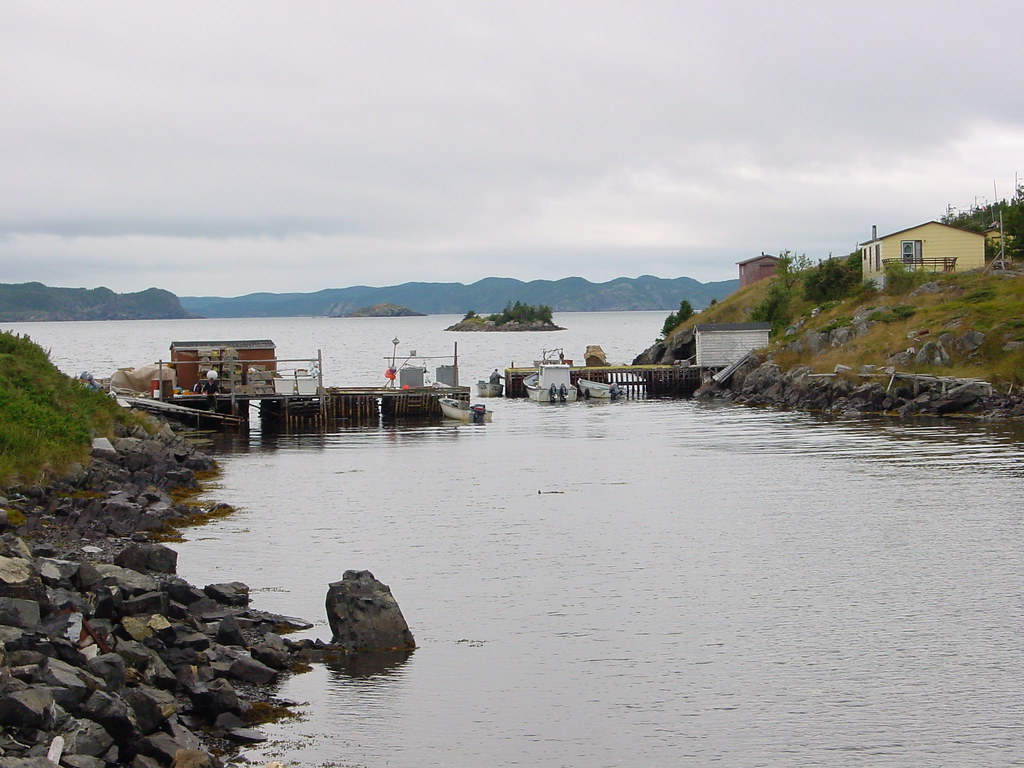Tedious would be the right way to describe my efforts to clean dead links from my ferry website over the holidays. Even that nasty task provided a nice side benefit. It offered an opportunity to view detailed portions of maps I’d not considered in awhile. That’s how I spotted Black Tickle as I repaired the map of Canadian ferries. It seemed such an odd name. Black Tickle. Really? It conjured theories that couldn’t possibly be true. There must have been some obscure meaning that made perfect sense to the founders of the town that remained hidden to me by time or distance.
Black Tickle
Black Tickle is a small community of a couple hundred people in Newfoundland and Labrador. It’s situated on a remote corner of the Island of Ponds off the Labrador coast. The Globe and Mail described it as A Town on Death Row. As explained in the article and on several other websites, “Black Tickle was founded in the mid-nineteenth century by a group of British seamen who had jumped ship.” They discovered that it was a pretty good base for reaching the rich fishing grounds of the nearby Grand Banks and for processing their catch for market. Many people lived in Black Tickle while the fishery prospered, with up to three thousand residents in the 1980’s.
Nearly everyone left after the cod populations plummeted. The government instituted a moratorium in an attempt to prevent overfishing of an already declining resource. Black Tickle lost its reason to exist. It teetered on irrelevance, a town with a wrecked economy, lacking running water, and no road to the outside world. This story still hasn’t reached a happy conclusion.
I don’t want to make light of the plight of the people of Black Tickle. It’s a serious set of issues. I hope they find a successful and prosperous way forward, and I wish them all well. Nonetheless its recent history, however compelling, did not explain the unusual name. I dug further.
Defining Tickle
I never realized that the Dictionary of Newfoundland English existed, but it does and it defines Tickle in excruciating detail with numerous examples. At its essence a Tickle in Newfoundland English is:
“A narrow salt-water strait, as in an entrance to a harbour or between islands or other land masses, often difficult or treacherous to navigate because of narrowness, tides, etc; a ‘settlement’ adjoining such a passage.”
That makes perfect sense. The town of Black Tickle is situated on a narrow salt-water strait in an area where one might expect to find the influence of Newfoundland English. Nonetheless, this can result in great fun for the rest of the English-speaking world not acculturated to Newfoundlander slang.
Prevalence

The Atlas of Canada includes 327 place names featuring Tickle. These included a variety populated places, water features and terrain features. They fell almost entirely within the boundaries of Newfoundland and Labrador (unsurprisingly) although a few meandered across the borders into Nova Scotia and Québec. It also included a small number of outliers such as Tickletoeteaser Tower, a mountain in British Columbia that I’ll assume derived from a more recognizable definition of tickle.
There are some great ones, and again I am not making them up. They are all listed in the Atlas of Canada. With apologies to Dictionary of Newfoundland English, I’ve decided to redefine some of them using the Dictionary of 12MC.
- Big Tickle — causing lots of laughter
- Muskrat Tickle — a hunting technique
- Motion Tickle — the act of tickling
- Goose Tickle Arm — a motion tickle that causes goosebumps
- Herring Head Tickle — a means to check the freshness of fish
- Favorite Tickle — oddly, not my favorite tickle
- Black Head Tickle — an acne medicine
- Man Rock Tickles — umm… no comment
- Jigger Tickle — the feeling in one’s throat after a shot of alcohol
- Cut Throat Tickle — a shaving accident
- Tickles Gut — a legitimate place to tickle
- Nimrod Tickle — I’ve discussed nimrods before
Bloody Tickle
My favorite one? Bloody Tickle, of course. It’s a channel located next to Tickle Island. I think I’m going to start using this one as a curse, say if I accidentally smash my thumb with a hammer. Bloody Tickle, that hurts!
Alternate definitions either from this list or from the larger Atlas of Canada list are welcomed.

Leave a Reply